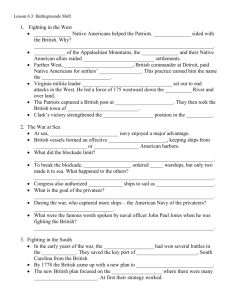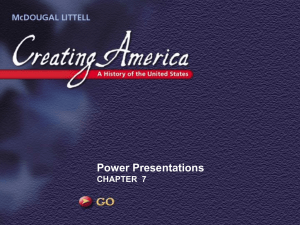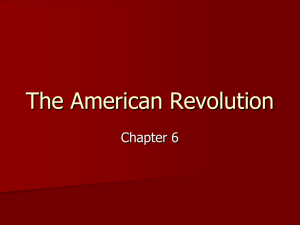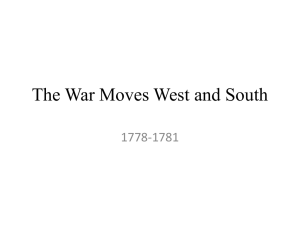The American Revolution: An Unlikely Victory ***December 25 1776
advertisement
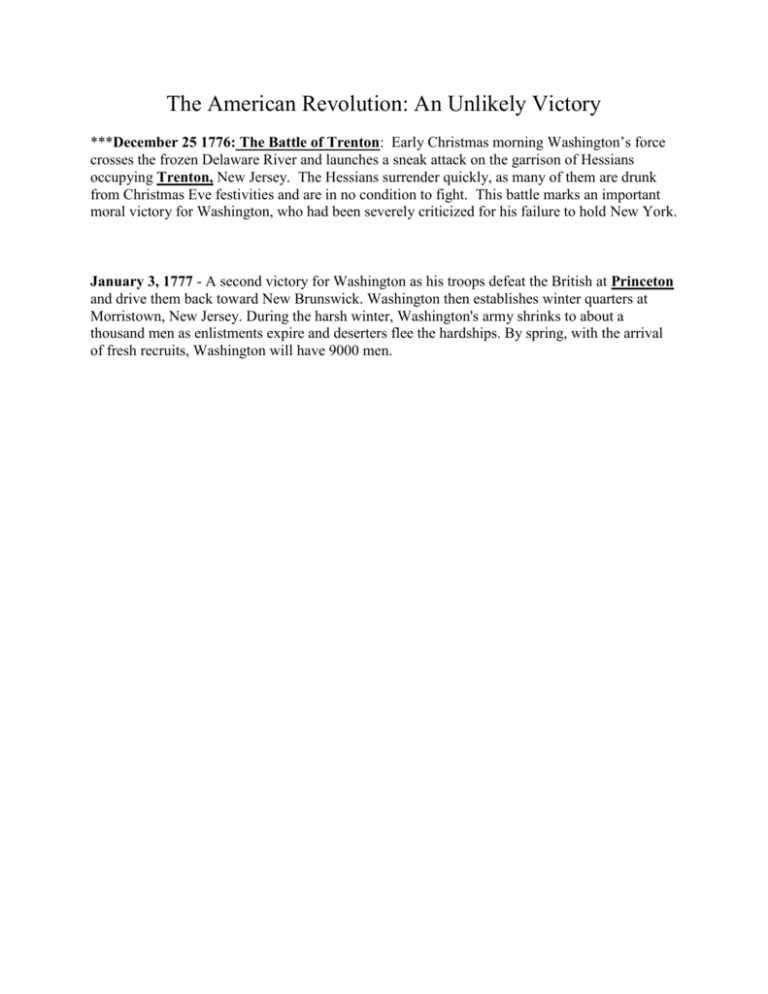
The American Revolution: An Unlikely Victory ***December 25 1776: The Battle of Trenton: Early Christmas morning Washington’s force crosses the frozen Delaware River and launches a sneak attack on the garrison of Hessians occupying Trenton, New Jersey. The Hessians surrender quickly, as many of them are drunk from Christmas Eve festivities and are in no condition to fight. This battle marks an important moral victory for Washington, who had been severely criticized for his failure to hold New York. January 3, 1777 - A second victory for Washington as his troops defeat the British at Princeton and drive them back toward New Brunswick. Washington then establishes winter quarters at Morristown, New Jersey. During the harsh winter, Washington's army shrinks to about a thousand men as enlistments expire and deserters flee the hardships. By spring, with the arrival of fresh recruits, Washington will have 9000 men. The Battles of Trenton, Princeton, and Monmouth June 14, 1777 - The flag of the United States consisting of 13 stars and 13 white and red stripes is mandated by Congress and first sewn by Baltimore native Betsy Ross; John Paul Jones is chosen by Congress to captain the 18 gun vessel Ranger with his mission to raid coastal towns of England. ***Change in British Strategy: After the loss of both Trenton and Princeton, British strategists decide to sever rebellious New England from the rest of the colonies through an invasion down the Hudson River. General John Burgoyne will march south from Canada and link up with General William Howe, who will march north from New York City. THE SARATOGA CAMPAIGN June 17, 1777 – Burgoyne’s force of 7700 men sail down Lake Champlain toward Albany, the site of the planned link-up with General Howe. July 6, 1777 - Gen. Burgoyne's troops stun the Americans with the capture of Fort Ticonderoga on Lake Champlain. Its military supplies are greatly needed by Washington's forces. The loss of the fort is a tremendous blow to American morale. July 23, 1777 - British Gen. Howe, with 15,000 men, sets sail from New York for Chesapeake Bay to capture Philadelphia, instead of sailing north to meet up with Gen. Burgoyne. August 1, 1777 - Gen. Burgoyne reaches the Hudson after a grueling month spent crossing 23 miles of wilderness separating the southern tip of Lake Champlain from the northern tip of the Hudson River. August 6 1777: A British force under British General Barry St.Leger, attempting to flank Gates’ army from the west, is ambushed and defeated at the Battle of Oriskany. ***August 16, 1777 - In the Battle of Bennington, militiamen from Vermont, aided by Massachusetts troops, wipe out a detachment of 800 German Hessians sent by Gen. Burgoyne to seize horses. September 26, 1777 - British forces under Gen. Howe occupy Philadelphia, forcing Congress to flee the city. ***October 7, 1777 - The Battle of Saratoga results in the first major American victory of the Revolutionary War as American generals Horatio Gates and Benedict Arnold defeat Gen. Burgoyne, inflicting 600 British casualties. American losses are only 150. October 17, 1777 - News of the American victory at Saratoga soon travels to Europe and boosts support of the American cause. In Paris the victory is celebrated as if it had been a French victory. Ben Franklin is received by the French Royal Court. France then recognizes the independence of America. The Saratoga Campaign November 1777: Marquis de Lafayette, a 19 year old French aristocrat, arrives in Philadelphia and volunteers to serve without pay. Congress appoints him as a major general in the Continental Army. Lafayette will become one of Gen. Washington's most trusted aides. (Lafayette, Louisiana, is named after this dude) ***November 15, 1777 - Congress adopts the Articles of Confederation as the provisional wartime government of the new United States of America, pending ratification by the individual states. Under the Articles, Congress is the sole authority of the new national government, but this authority is subservient to the sovereignty of the individual states. December 17, 1777 - At Valley Forge in Pennsylvania, the Continental Army led by Washington sets up winter quarters and undergoes a brutal winter. ***February 6, 1778 - American and French representatives sign two treaties in Paris: a Treaty of Amity and Commerce and a Treaty of Alliance. France now officially recognizes the United States and will soon become the major supplier of military supplies to Washington's army. Both countries pledge to fight until American independence is won, with neither country concluding any truce with Britain without the other's consent, and guarantee each other's possessions in America against all other powers. After the French enter the war: The American struggle for independence is enlarged and will soon become a world war. After British vessels fire on French ships, the two nations declare war. Spain will enter in 1779 as an ally of France. The following year, Britain will declare war on the Dutch who have been engaging in profitable trade with the French and Americans. In addition to the war in America, the British will have to fight in the Mediterranean, Africa, India, the West Indies, and on the high seas, all the while facing possible invasion of England itself by the French. (Think of the allocation of resources and money Britain will need to wage war on this scale) February 23, 1778 - Baron von Steuben of Prussia (part of Germany) arrives at Valley Forge to join the Continental Army. He then begins much needed training and drilling of Washington's troops, now suffering from poor morale resulting from cold, hunger, disease, low supplies and desertions over the long, harsh winter. March 16, 1778 - A Peace Commission is created by the British Parliament to negotiate with the Americans. The commission then travels to Philadelphia where its offers granting all of the American demands, except independence, are rejected by Congress. May 8, 1778 - British General Henry Clinton replaces Gen. Howe as commander of all British forces in the American colonies after his failure to cooperate with Burgoyne at Saratoga. May 30, 1778 - A campaign of terror against American frontier settlements, instigated by the British, begins as 300 Iroquois Indians burn Cobleskill, New York. June 19, 1778 - Washington sends troops from Valley Forge to intercept Gen. Clinton, who has decided to march his army from Philadelphia to New York with the intent of capturing the America fortress at West Point. June 27/28, 1778 - The Battle of Monmouth occurs in New Jersey as Washington's troops and Gen. Clinton's troops fight to a standoff. July 3, 1778 - British Loyalists and Indians massacre American settlers in northwestern Pennsylvania frontier. July 10, 1778 - France declares war against Britain. ***September 14, 1778 - Benjamin Franklin is appointed to be the American diplomatic representative in France. November 11, 1778 - At Cherry Valley, New York, Loyalists and Indians massacre over 40 American settlers. December 1778: The British decide to take advantage of a large Loyalist population in the South and redirect their focus on the southern colonies. December 29, 1778 - The British begin a major southern campaign with the capture of Savannah, Georgia, followed a month later with the capture of Augusta. April 1-30, 1779 - In retaliation for Indian raids on colonial settlements, American troops from North Carolina and Virginia attack Chickamauga Indian villages in Tennessee. June 1, 1779 - British Gen. Clinton arrives in New York and sends a force of takes 6000 men up the Hudson River toward West Point, a seemingly-impregnable fortress which commands traffic on the Hudson River. June 16, 1779 - Spain declares war on England, but does not make an alliance with the American revolutionary forces. August 14, 1779 - A peace plan is approved by Congress which stipulates independence, complete British evacuation of America and free navigation on the Mississippi River. August 29, 1779 - American forces defeat the combined Indian and Loyalist forces at Elmira, New York. Following the victory, American troops head northwest and destroy nearly 40 Cayuga and Seneca Indian villages in retaliation for the campaign of terror against American settlers. Sept. 3 - Oct. 28 - Americans suffer a major defeat while attacking the British at Savannah, Georgia. September 23, 1779 - Off the coast of England, John Paul Jones fights a desperate battle with a British frigate. When the British demand his surrender, Jones responds, "I have not yet begun to fight!" Jones then captures the frigate before his own ship, the Ranger, sinks. September 27, 1779 - John Adams is appointed by Congress to negotiate peace with England. October 17, 1779 - Washington sets up winter quarters at Morristown, New Jersey, where his troops will suffer another harsh winter without desperately needed supplies, resulting in low morale, desertions and attempts at mutiny. December 26, 1779 - British Gen. Clinton sets sail from New York with 8000 men and heads for Charleston, South Carolina, arriving there on Feb. 1. April 8, 1780 - The British attack begins against Charleston as warships sail past the cannons of Fort Moultrie and enter Charleston Harbor. Washington sends reinforcements. ***May 12, 1780 - The worst American defeat of the Revolutionary War occurs as the British capture Charleston and its 5400-man garrison (the entire southern American Army) along with four ships and a military arsenal. British losses are only 225. May 25, 1780 - After a severe winter, Gen. Washington faces a serious threat of mutiny at his winter camp in Morristown, New Jersey. Two Continental regiments conduct an armed march through the camp and demand immediate payment of salary (overdue by 5 months) and full rations. Troops from Pennsylvania put down the rebellion. Two leaders of the protest are then hanged. June 11, 1780 - A new Massachusetts constitution is endorsed asserting "all men are born free and equal," which includes black slaves. June 13, 1780 - Gen. Horatio Gates is commissioned by Congress to command the Southern Continental Army. July 11, 1780 - 6000 French soldiers under Count de Rochambeau arrive at Newport, Rhode Island. They will remain there for nearly a year, blockaded by the British fleet. August 3, 1780 – Washington appoints General Benedict Arnold commander of West Point. Unknown to the Americans, he has been secretly collaborating with British Gen. Clinton since May of 1779 by supplying information on Washington's tactics. August 18, 1780 - An American defeat at Fishing Creek, South Carolina, opens a route for Gen Cornwallis to invade North Carolina. ***September 23, 1780 – John Andre, a British major in civilian clothing, is captured near Tarrytown, New York. He is found to be carrying plans indicating Benedict Arnold intends to turn traitor and surrender West Point to the British. Two days later, Arnold hears of Andre’s capture and flees West Point to the British ship Vulture on the Hudson. He is later named a brigadier general in the British Army and will fight the Americans. October 7, 1780 - Gen. Cornwallis abandons his invasion of North Carolina after Americans capture his reinforcements, a Loyalist force of 1000 men. October 14, 1780 – After General Gate’s shameful performance at Fishing Creek (he abandoned his army in full retreat) Gen. Nathanael Greene Washington's most able and trusted general, is named as the new commander of the Southern Army. ***October 1780-February 1781: Greene then begins a strategy of rallying popular support and wearing down the British by leading Gen. Cornwallis on a six month chase through the back woods of South Carolina, North Carolina, Virginia, and then back into North Carolina. The British, low on supplies, are forced to forage (steal) from any Americans they encounter, thus enraging them even further. January 3, 1781 - Mutiny among Americans in New Jersey as troops from Pennsylvania set up camp near Princeton and choose their own representatives to negotiate with state officials back in Pennsylvania. The crisis is eventually resolved through negotiations, but over half of the mutineers abandon the army. ***January 17, 1781 - An American victory at Cowpens, South Carolina, as Gen. Daniel Morgan defeats British cavalry commander General Banastre “Bloody” Tarleton. (This battle is the climactic battle in the movie The Patriot) January 20, 1781 - Mutiny among American troops at Pompton, New Jersey. The rebellion is put down seven days later by a 600-man force sent by Gen. Washington. Two of the leaders are then hanged. ***March 15, 1781 - Forces under Gen. Cornwallis suffer heavy losses in the Battle of Guilford Courthouse in North Carolina. As a result, Cornwallis abandons plans to conquer the Carolinas and begins a campaign to conquer Virginia with an army of 7500 men. June 4, 1781 –Virginia’s wartime governor, Thomas Jefferson, narrowly escapes capture by the British at Charlottesville, Virginia. June 10, 1781 - American troops under Marquis de Lafayette, Gen. “Mad Anthony”Anthony Wayne and Baron von Steuben begin to form a combined force in Virginia to oppose British forces under Gen. Cornwallis. June 11, 1781 - Congress appoints a Peace Commission comprised of Benjamin Franklin, Thomas Jefferson, John Jay and Henry Laurens. The commission supplements John Adams as the sole negotiator with the British. July 20, 1781 - Slaves in Williamsburg, Virginia, rebel and burn several buildings. August 1, 1781 - After several months of chasing Gen. Greene's army without much success, Gen. Cornwallis and his 10,000 tired soldiers arrive to seek rest on the Yorktown, Virginia, peninsula on Chesapeake Bay. He then establishes a base with the intention of evacuating his army by sea and joining Gen. Clinton's forces in New York. August 14, 1781 - Washington abruptly changes plans and abandons the attack on New York in favor of Yorktown after receiving a letter from French Admiral Count de Grasse indicating his entire 29-ship French fleet with 3000 soldiers is now heading for the Chesapeake Bay near Cornwallis. Washington then coordinates with Rochambeau to rush their best troops south to Virginia to destroy the British position in Yorktown. August 30, 1781 - Count de Grasse's French fleet arrives off Yorktown, Virginia. De Grasse then lands troops near Yorktown, linking with Lafayette's American troops to cut Cornwallis off from any retreat by land. ***September 5-8, 1781 - Off Yorktown, a major naval battle, the Battle of the Virginia Capes, between the French fleet of de Grasse and the outnumbered British fleet of Adm. Thomas Graves results in a victory for de Grasse. The British fleet retreats to New York for reinforcements, leaving the French fleet in control of the Chesapeake. The French fleet establishes a blockade, cutting Cornwallis off from any retreat by sea. September 28, 1781 - Washington, with a combined Allied army of 17,000 men, arrives in Virginia and begins the siege of Yorktown. French cannons bombard Gen. Cornwallis and his 9000 men day and night while the Allied lines slowly advance and encircle them. British supplies run dangerously low. October 17, 1781 - As Yorktown is about to be taken, the British send out a flag of truce. Gen. Washington and Gen. Cornwallis then work out terms of surrender. ***October 19, 1781 - As their band plays the tune, "The world turned upside down," the British army marches out in formation and surrenders at Yorktown. Hopes for a British victory in the war against America are dashed. In the English Parliament, there will soon be calls to bring the long costly war to an end. October 24, 1781 - 7000 British reinforcements under Gen. Clinton arrive at Chesapeake Bay but turn back on hearing of the surrender at Yorktown. January 1, 1782 - Loyalists begin leaving America, heading north to Nova Scotia and New Brunswick. February 27, 1782 - In England, the House of Commons votes against further war in America; the British Parliament empowers the King to negotiate peace with the United States. March 7, 1782 - American militiamen massacre 96 Delaware Indians in Ohio in retaliation for Indian raids conducted by other tribes. March 20, 1782 - British Prime Minister, Lord North, resigns, succeeded two days later by Lord Rockingham who seeks immediate negotiations with the American peace commissioners. April 12, 1782 - Peace talks begin in Paris between Ben Franklin and Richard Oswald of Britain. French officials protest that this negotiation, which does not include the French, is a violation of the American-French Treaty of Amity and Commerce which prohibits either side from conducting a separate peace with Britain. They are correct; it is. August 19, 1782 - Loyalist and Indian forces attack and defeat American settlers near Lexington, Kentucky. August 25, 1782 - Mohawk Indian Chief Joseph Brant conducts raids on settlements in Pennsylvania and Kentucky. November 10, 1782 - The final battle of the Revolutionary War occurs as Americans retaliate against Loyalist and Indian forces by attacking a Shawnee Indian village in the Ohio territory. November 30, 1782 - A preliminary peace treaty is signed in Paris. Terms include recognition of American independence and the boundaries of the United States, along with British withdrawal from America. December 15, 1782 - In France, strong objections are expressed by the French over the signing of the peace treaty in Paris without America first consulting them. Ben Franklin then soothes their anger with a diplomatic response and prevents a falling out between France and America. January 20, 1783 - England signs a preliminary peace treaty with France and Spain. February 3, 1783 - Spain recognizes the United States of America. February 4, 1783 - England officially declares an end to hostilities in America. March 10, 1783 – The Newburgh Conspiracy: An anonymous letter circulates among Washington's senior officers camped at Newburgh, New York. The letter calls for an unauthorized meeting and urges the officers to defy the authority of the new U.S. national government (Congress) for its failure to honor past promises to the Continental Army. The next day, Gen. Washington forbids the unauthorized meeting and instead suggests a regular meeting to be held on March 15. A second anonymous letter then appears and is circulated. This letter falsely claims Washington himself sympathizes with the rebellious officers. March 15, 1783 - General Washington gathers his officers and talks them out of a rebellion against the authority of Congress, and in effect preserves the American democracy. April 11, 1783 - Congress officially declares an end to the Revolutionary War. April 26, 1783 - 7000 Loyalists set sail from New York for Canada, bringing a total of 100,000 Loyalists who have now fled America. June 24, 1783 - To avoid protests from angry and unpaid war veterans, Congress leaves Philadelphia and relocates to Princeton, New Jersey. ***July 8, 1783 - The Supreme Court of Massachusetts abolishes slavery in that state. ***October 7, 1783 - In Virginia, the House of Burgesses grants freedom to slaves who served in the Continental Army.

